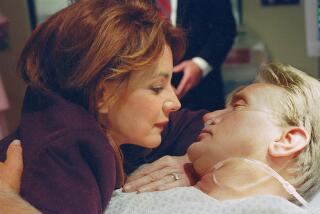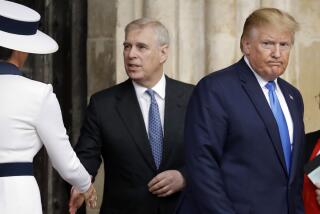White House Lashes Back at Willey Charges
- Share via
WASHINGTON — The White House sought Monday to discredit a former supporter’s assertion that President Clinton groped her in an Oval Office hallway, releasing copies of admiring letters the woman sent to Clinton after the alleged incident took place.
The correspondence also indicates that the woman, Kathleen E. Willey, gave Clinton a tie after the alleged encounter and on another occasion invited him to an engagement party she was hosting.
Clinton, who previously has denied under oath any improper sexual advance toward Willey, said on Monday he was “mystified and disappointed” that she accused him during a nationally televised interview of sexually assaulting her when she sought his help in obtaining a paying job Nov. 29, 1993. The president, briefly answering reporters’ questions during a public appearance, said he had a “clear memory” of the meeting and emphatically denied Willey’s characterization of events.
In the letters released by the White House, Willey asked for positions representing the United States at foreign conferences, offered to work in the president’s 1996 reelection campaign and repeatedly expressed her esteem and fondness for Clinton.
Two days after the alleged Oval Office incident and the suicide of her husband, Willey called the White House and left a message for the president to “call her any time,” according to a White House memorandum.
Three weeks later--on Dec. 20, 1993--she sent the president a cheery Christmas greeting referring to her “bittersweet year,” and mentioned her desire to obtain a meaningful job at the White House in 1994.
White House officials say they hope the correspondence will raise questions about the credibility of Willey’s characterization of herself as an “angry” victim of a crude and “reckless” sexual pass by the president.
“These letters put in a context why the president is mystified,” one senior White House official said. “They do not show an estranged person or a person offended or insulted.”
“The strategy was essentially that she said all this . . . about how she was distressed and disillusioned, and we think this is a body of material that reflects behavior--at least in writing--that doesn’t necessarily square with what she said,” added another senior White House official.
In her testimony in the Paula Corbin Jones sexual-harassment case against the president and on CBS’ “60 Minutes” Sunday night, Willey said the president fondled one of her breasts and put her hand on his crotch when she came to him distressed about her family’s financial troubles and asked him to turn her volunteer position at the White House into a paying job. That same day her husband, Ed, a lawyer and a financial backer of the president, committed suicide. But neither Willey nor Clinton knew about it at the time.
The president, by contrast, has said he gave Willey a hug and may have kissed her on the forehead because she was distressed, but he denies there was anything sexual about the encounter.
One of the president’s personal lawyers, Robert S. Bennett, Monday night pointed to Willey’s correspondence with Clinton after the alleged incident as part of key information the American people needed to help them make up their minds about what happened during the Oval Office meeting.
Appearing on CNN’s “Larry King Live,” Bennett also said that Willey’s lawyer, Daniel Gecker, is attempting to arrange a $300,000 book deal for his client. The American people “may have had a different opinion” of Willey’s account if they knew there was a book in the works, Bennett said.
Neither Willey nor Gecker could be reached for comment Monday night.
Willey, 51, said in her “60 Minutes” interview that after her encounter with Clinton she was “angry” and felt she had “been taken advantage of.” None of that sentiment is expressed in the correspondence released by the White House.
* On June 17, 1994, Willey sent a note telling the president that hearing his D-Day speech in France commemorating the invasion was “the proudest I have been that you are our president.”
* On Oct. 18, 1994, Willey wrote a note pledging her support: “I don’t need to remind you of my willingness to help you in any way that I can.”
* On Nov. 11, 1994, she calls herself his “number one fan” in a note that also tells the president how much she has been thinking about him.
* Nov 10, 1997, almost four years after the alleged incident, she wrote the president’s secretary asking for an invitation to one of the large Christmas parties at the White House.
In all, the White House released 15 letters or notes from Willey to the president between May 1993 and November 1996, five more written messages to the president’s secretary, four calls from Willey to the president between April 1993 and January 1994, four written messages from the president to Willey, as well as an assortment of other correspondences from White House officials concerning Willey. White House spokesman Joe Lockhart said the record represented everything officials had found.
As the White House scrambled to undermine Willey’s credibility with the release of the material, some analysts suggested that the effort could backfire, contributing to the picture of Willey as a woman who harbored no animosity toward Clinton and therefore would have no reason to concoct a fabricated version of her Oval Office meeting with Clinton.
“To me, what the letters do is reinforce that this woman doesn’t wish him any ill will,” said Charles Cook, a political analyst in Washington.
The White House point person for the day was deputy communications director Ann Lewis, who said she talked with Willey about a job in Clinton’s reelection campaign in 1996.
“When I watched [Willey] last night, I was kind of stunned,” Lewis said. “I met with her in 1996, and the person I met with and the conversations we had were so very different. She spoke in very positive terms of her association with the president. She seemed so interested and determined to work for the president.”
White House officials also emphasized that a friend of Willey’s, Julie Steele, at first confirmed for a Newsweek reporter last year that Willey told her of Clinton’s alleged sexual advance, but later called the reporter back to tell him that Willey had put her up to making that statement.
Willey’s televised account of her story clearly unnerved some of the president’s congressional allies.
One Democratic member of Congress said: “I don’t know if this is enough to get him impeached, but everybody’s uneasy--sure. We’re all uneasy.”
More to Read
Sign up for Essential California
The most important California stories and recommendations in your inbox every morning.
You may occasionally receive promotional content from the Los Angeles Times.













